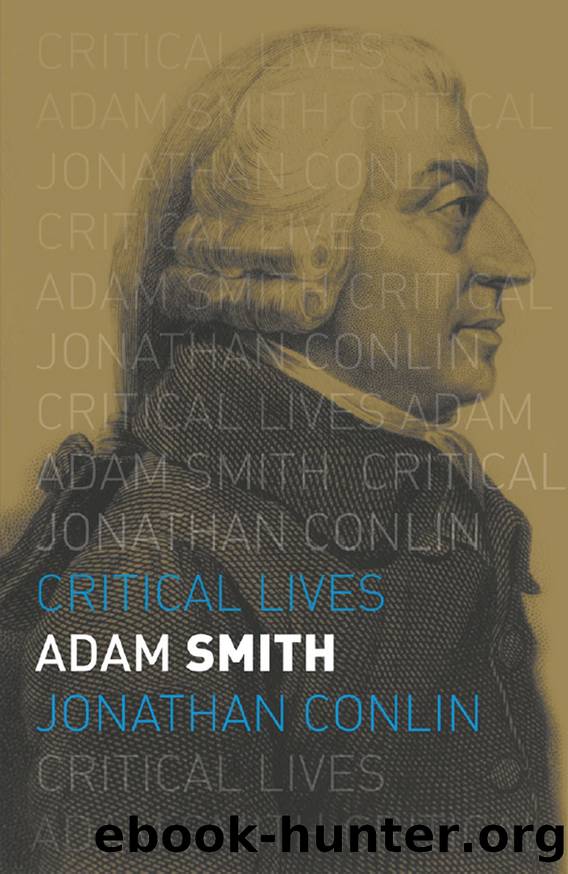Adam Smith by Jonathan Conlin

Author:Jonathan Conlin
Language: eng
Format: epub
Publisher: Reaktion Books
Jean Dambrun after Clément-Pierre Marillier, Il retourne chez ses Egaux, c. 1783, etching with engraving. Disgusted with the depravity he finds among the âcivilizedâ, Rousseauâs noble savage returns to his forest.
While Rousseau insisted that humans had no instincts such as might distinguish them from other animals, Smith saw humans as distinguished by an inborn âdisposition to truck, barter and exchangeâ with each other that itself underlay the specialization of labour, some of whose benefits (increased production, improvement in quality) are obvious from the pin parable quoted in the Introduction. Smith would open The Wealth of Nations with this account of âthe causes of improvementâ, noting how the degree of labour specialization is limited by the size of the market. The larger the market, the greater the specialization. In a âremote countryâ (that is, one that is geographically isolated), Smith noted, every man has to be brewer, baker and butcher to his family, because a small community cannot sustain a full-time baker, brewer or butcher. Specialization is also limited thanks to another problem with a barter economy: the fact that one cannot always be sure of finding someone willing to trade at the right time. The butcher has slaughtered a cow and has plenty of surplus meat that the baker would like to have. But the butcher does not need bread right now, and bread is all that the baker has to offer. The butcher will need bread next week, but by then the meat will have gone off, freezers not being available. âThey are all of them thus mutually less serviceable to one anotherâ (WN, 37).
Hence the invention of money and its sole purpose as a store of value. You cannot eat money, nor can it clothe or house you. The value of money is what Smith calls âexchange valueâ, to differentiate it from âvalue in useâ (WN, 44). It is intrinsically worthless, and its value in exchange is based solely on custom, on loose consensus among a group of people that this particular thing will, to borrow a phrase printed on American dollar bills, serve as âtender for all debts, public and privateâ. To make his point about the intrinsic worthlessness of money Smith notes the many different objects that have served as means of exchange in the past, including nails and lead bars. During the Siege of Montreal in 1760 those trapped inside the city used playing cards as currency.
Where money enables everyone to exchange their surplus, a web of interdependencies emerges that not only boosts output but improves quality of life, even for those at the bottom of a commercial society, who thus enjoy a standard of living superior to those at the pinnacle of a lower, earlier stage of social development, be that the first âAge of Huntersâ or the second âAge of Shepherdsâ. It is notable how Smith describes the vast web of trading connections that the specialization of labour and free trade make possible. Spread across the entire globe, all these specialists nonetheless collaborate to provide for the common workmanâs needs.
Download
This site does not store any files on its server. We only index and link to content provided by other sites. Please contact the content providers to delete copyright contents if any and email us, we'll remove relevant links or contents immediately.
Blood and Oil by Bradley Hope(1250)
Daniel Holmes: A Memoir From Malta's Prison: From a cage, on a rock, in a puddle... by Daniel Holmes(1118)
Ambition and Desire: The Dangerous Life of Josephine Bonaparte by Kate Williams(1087)
Wandering in Strange Lands by Morgan Jerkins(1019)
It Was All a Lie by Stuart Stevens;(942)
What Really Happened: The Death of Hitler by Robert J. Hutchinson(871)
London in the Twentieth Century by Jerry White(848)
Time of the Magicians by Wolfram Eilenberger(844)
Twilight of the Gods by Ian W. Toll(813)
The First Conspiracy by Brad Meltzer & Josh Mensch(812)
The Japanese by Christopher Harding(803)
A Woman by Sibilla Aleramo(796)
Lenin: A Biography by Robert Service(780)
The Devil You Know by Charles M. Blow(779)
Reading for Life by Philip Davis(774)
Twelve Caesars by Mary Beard(769)
Cleopatra by Alberto Angela(767)
1965--The Most Revolutionary Year in Music by Andrew Grant Jackson(715)
The Life of William Faulkner by Carl Rollyson(714)
